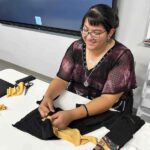By Megan Head
English graduate student Melissa Chavira tutors in the writing labs of Texas A&M University-San Antonio and Palo Alto College. She assists mostly transfer and returning students and understands that writing and collaboration are crucial across all disciplines in the academic setting.
“Strengthening [students’] writing skills has become one passion of mine,” said Chavira said, who aspires to teach at the community college level.
In a panel at Friday’s Southwest Teaching and Learning Conference, Chavira, two faculty and another student will share their presentation titled “Building a Collaborative, Student-Focused Writing Center.”
“We thought it would be a really good idea to present a topic on collaboration and focus on our writing center,” Chavira said. The presentation will focus on the writing center’s philosophy and the collaboration with Palo Alto College.
As more colleges and universities serve nontraditional students, faculty are taking new approaches to best educating those students. For instance, what is the best approach to promote student leadership and research? How are cross culture and mixed culture classrooms handled? How successful are online, hybrid and hyflex courses?
The Southwest Teaching and Learning Conference will address these issues in a number of panels, research presentations and workshops this weekend.
The sixth annual conference extends from 9 a.m.-4:30 p.m Friday and continues 9 a.m.-12:30 p.m. Saturday at the Main Campus Building, One University Way.
“It’s a professional conference aimed at primarily college and higher education faculty,” said conference chair Dr. Tracy Hurley.
This year’s conference theme, “Teaching and Learning: A Collaborative Approach,” targets teaching research and practices.
Keynote speaker, Dr. Jo-Carol Fabianke, vice chancellor for academic success at the Alamo Colleges, hopes to raise awareness among the conference attendees of the education gap between high school and college students.
Fabianke said many students don’t know how to regulate learning on their own once they transition into college.
“We really kind of have an expectation of that from students, and yet I don’t think any of us are really focusing on helping students to make that transition,” Fabianke said.
Fabianke hopes to bring a better understanding of the differing expectations students and faculty have in higher education settings.
The conference will feature three research presentations co-authored by A&M-SA faculty. Education assistant professors Mishaleen Allen and Edith Young will host the first presentation; the second, by business assistant professors Leonard Love and Chin-Yen Liu, and Academic Technology Manager Sherita Love; and the third, by education associate professor Robin Kapavik and adjunct faculty Heather Brezinski.
Hurley expects over 130 registered participants this year, but anticipates significant growth next year when Central Academic Building opens at the permanent campus.
Those interested can register online through the conference day. Registration the day of the conference will take place in the cafeteria of Main Campus.
Registration costs $25 for A&M-SA staff, faculty and students, and $250 for all other participants.
Other various sessions and panels will be held in different classrooms throughout Main Campus.





